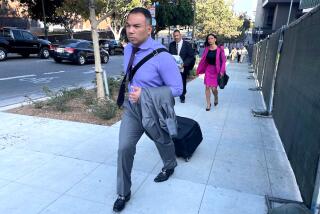Mob Bosses Tend to Keep It All in the Family
- Share via
NEW YORK — The two bosses met in 1988, in a lower Manhattan apartment. Vincent “The Chin” Gigante, swathed in a bathrobe and pajamas, sat and spoke with fellow Mafioso John Gotti.
After a brief business discussion, Gotti proudly told Gigante that his son, John Jr., was now a made man.
“Instead of congratulating him, Chin said, ‘Geez, I’m sorry to hear that,’ ” recalled Sammy “The Bull” Gravano in his biography, “Underboss.”
None of Chin’s sons were in the mob, Gravano wrote, and he added: “I wanted my son to be legitimate, to have nothing to do with what I did.”
Despite such protestations, authorities now say, both Gigante and Gravano eventually brought their sons into the underworld--like godfather, like son.
Andrew Gigante, 45, faces a new federal indictment on racketeering charges for allegedly ferrying his father’s orders from prison to the hierarchy of the Genovese crime family. The “Chin” was accused of running the powerful family from his cell.
Last year, 24-year-old Gerard Gravano pleaded guilty to federal drug charges, receiving a 15-year jail sentence. The elder Gravano, once underboss of the Gambino family, entered a guilty plea to the same crimes.
The unhappy endings were predictable. Going back to the mob matriculation of Bill Bonanno in the early 1950s, the ascension of a mob son inevitably leads to unmitigated disaster:
* Carmine “The Snake” Persico was the proud father of Alphonse “Allie Boy” Persico, who followed him as head of the Colombo family . . . and then followed him into jail on racketeering charges. Both remain in custody.
* Raymond “Junior” Patriarca succeeded his father, Raymond L.S. Patriarca, as the boss of the New England mob--and failed miserably. Junior, who pleaded guilty to racketeering in 1991, “couldn’t lead a Brownie troop,” said one New England mob expert.
* John A. Gotti, son of the “Dapper Don” John Gotti, took over the Gambino family from his old man before joining him in federal lockup. John Sr. will die in jail; Junior is eligible for parole in September 2004. “You’re not talking about a brain surgeon,” an FBI official once said of Junior.
“Naturally, authorities are paying attention to these kids,” says organized crime expert Howard Abadinsky.
A half-century ago, old-school mobsters steered their kids away from the Mafia. The Chicago mob became particularly adroit at steering its next generation into the legitimate world.
Tommy “Three-Finger Brown” Luchese’s son won an appointment to West Point. Joe Bonanno wanted his eldest son, Bill, to become an attorney.
Yet Bill succumbed to the lure of the fast buck and was nearly assassinated during the “Banana Wars” of the mid-1960s. He spent most of the next two decades behind bars on a variety of charges.
Carlo Gambino, a Bonanno contemporary, set up his sons Thomas and Joseph with legitimate businesses in Manhattan’s garment district. Authorities alleged that Thomas was a capo in the family, but it took them a long time to prove it: He was convicted of racketeering in 1993, 27 years after his father’s death.
Unlike other godfathers’ sons, Andrew Gigante made it through his first 44 years as a model citizen. His only courtroom visits involved pushing his father’s wheelchair to the defense table at a 1997 trial.
Despite his pristine record, the younger Gigante was jailed after a prosecutor described him as a danger to the community and a flight risk. Gigante pleaded not guilty to all charges in the case and was released on $2.5-million bond.
More to Read
Sign up for Essential California
The most important California stories and recommendations in your inbox every morning.
You may occasionally receive promotional content from the Los Angeles Times.













